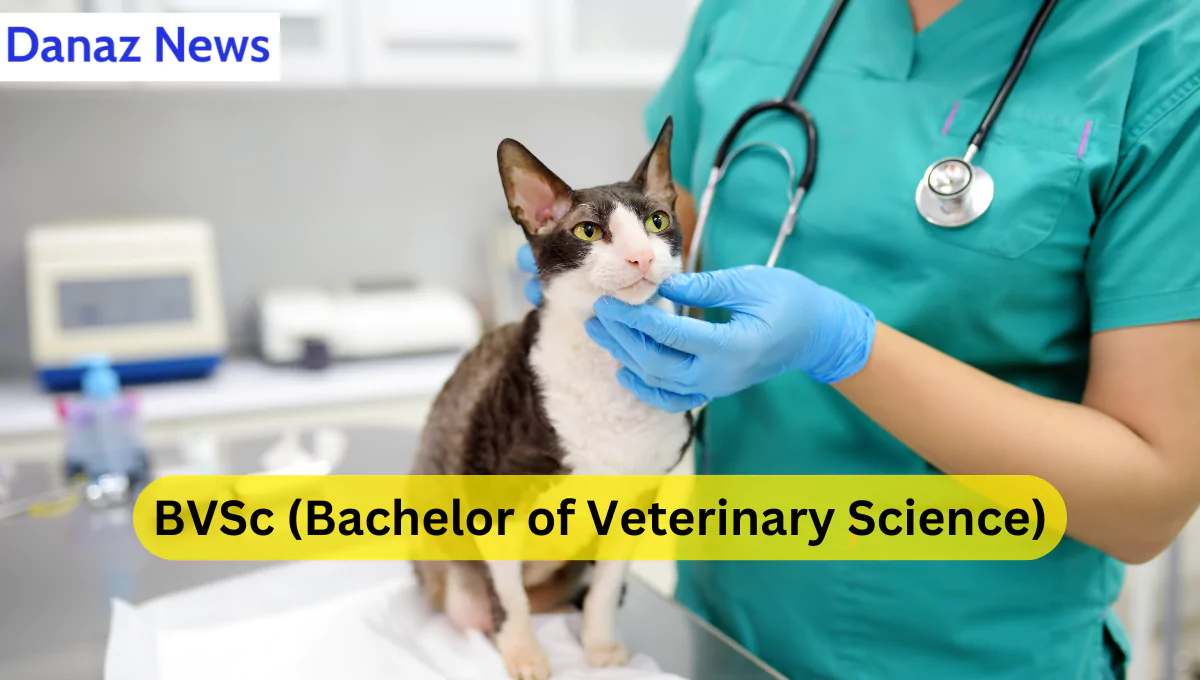The Bachelor of Veterinary Science (BVSc) is a specialized undergraduate degree that focuses on the study of animal health, welfare, and disease management. As the field of veterinary science continues to grow, the BVSc degree offers students opportunities to develop in-depth knowledge and skills needed to pursue careers in animal healthcare. From diagnosing diseases to performing surgeries, BVSc graduates play a vital role in animal welfare.
This article covers all the important aspects of the BVSc course, including its eligibility criteria, admission process, course structure, career prospects, and more. If you’re passionate about animals and interested in a career as a veterinarian, this comprehensive guide will help you understand what the BVSc program entails.
Overview of BVSc
The Bachelor of Veterinary Science (BVSc) is a five-and-a-half-year program that trains students in the fundamentals of veterinary medicine, surgery, animal management, and animal production. It includes both theoretical knowledge and practical training, ensuring that students gain hands-on experience in animal care. The course culminates in a one-year internship, which is mandatory for all students and helps them gain real-world exposure.
Here’s an overview of the BVSc course:
| Particulars | Details |
| Course Name | Bachelor of Veterinary Science (BVSc) |
| Abbreviation | B.V.Sc |
| Course Level | Undergraduate |
| Course Duration | 5.5 years (including internship) |
| Eligibility | 10+2 with PCB (Physics, Chemistry, Biology) |
| Course Type | Degree |
| Field of Study | Veterinary Science |
| Average Course Fees | ₹4,000 to ₹30.25 Lakhs |
| Average Salary | ₹6.1 LPA |
| Top Recruiters | IVRI, PETA India, CRPF, ICMR, Vixilanciaa |
| Top Career Options | Veterinary Surgeon, Veterinary Doctor, Veterinary Technologist |
Why Choose BVSc?
The BVSc program offers a unique combination of science and compassion, allowing students to learn the complexities of animal health, disease diagnosis, treatment, and animal welfare. Veterinary science is an essential field that helps protect and maintain the health of both domestic and wild animals. Graduates of the program are in high demand in various sectors such as private clinics, government hospitals, research institutions, and even wildlife conservation organizations.
Here are some key reasons why students choose to pursue a BVSc degree:
- Diverse Career Options: Graduates can work as veterinary doctors, surgeons, consultants, or technologists in both public and private sectors.
- Wide Scope: Veterinary graduates can also explore opportunities in research, animal welfare organizations, military services, and more.
- High Employability: The demand for skilled veterinarians continues to grow due to the increasing awareness of animal welfare and the expansion of the pet care industry.
- Rewarding Profession: Veterinary science is a noble field where you directly impact the well-being of animals.
Note:-For more details on the Top 10 Medical Courses in India, click here
BVSc Eligibility Criteria
To pursue a BVSc degree, candidates must meet the following eligibility requirements:
| Eligibility Criteria | Details |
| Educational Qualification | Must have completed 10+2 with Physics, Chemistry, and Biology (PCB) |
| Minimum Percentage | At least 50% aggregate in 10+2 (may vary by institution) |
| Age Limit | Candidates must be at least 17 years old |
| Entrance Exams | Some universities require candidates to pass entrance exams such as NEET, RPVT, or state-level exams |
| Lateral Entry | Students with a background in Zoology in 10+2 are sometimes eligible for lateral entry |
Many universities and veterinary colleges in India conduct entrance exams to shortlist candidates for the BVSc program. The minimum percentage required for admission may vary by college, with some institutions offering direct admission based on merit while others may require entrance exams and interviews.
BVSc Course Duration and Structure
The BVSc program spans 5.5 years, which includes:
- Four and a half years of academic study
- One year of compulsory internship
During the academic portion of the course, students will cover various aspects of veterinary science, including anatomy, physiology, pharmacology, pathology, animal nutrition, surgery, and disease management. The final year of the program is devoted to practical training in a real-world setting, where students gain hands-on experience in treating animals under the guidance of licensed veterinarians.
BVSc Fees Structure
The fees for the BVSc program vary significantly depending on whether the student is enrolled in a government or private institution. Here’s a breakdown of the average fees across different types of colleges:
| Institution Type | Average Fees |
| Government Colleges | ₹4,000 to ₹5.40 Lakhs |
| Private Colleges | ₹2.36 Lakhs to ₹30.25 Lakhs |
Government veterinary colleges tend to have lower fees compared to private institutions. Some government colleges may even offer scholarships or fee waivers to students from underprivileged backgrounds or based on merit.
Top BVSc Colleges in India
Numerous prestigious institutions across India offer the BVSc degree. Below are some of the top colleges, categorized by their location and type:
Top BVSc Colleges by State
| State | Top Colleges |
| Tamil Nadu | Tamil Nadu Veterinary and Animal Sciences University |
| Rajasthan | Rajasthan University of Veterinary and Animal Sciences |
| Maharashtra | Maharashtra Animal and Fishery Sciences University |
| Uttar Pradesh | Uttar Pradesh Pandit Deen Dayal Upadhyaya Pashu Chikitsa Vishwavidyalaya |
| Delhi NCR | National Dairy Research Institute |
| Gujarat | Junagadh Agricultural University |
Top Private BVSc Colleges in India
| College Name | Location | Fees |
| Singhania University | Jhunjhunu, Rajasthan | ₹5 Lakhs |
| Arawali Veterinary College | Sikar, Rajasthan | ₹30.25 Lakhs |
| Khalsa College of Veterinary and Animal Science | Amritsar, Punjab | Not Available |
| Mahatma Jyotiba Fule College of Veterinary Science | Jaipur, Rajasthan | ₹27.50 Lakhs |
| International Institute of Veterinary Education | Rohtak, Haryana | ₹2.36 Lakhs |
Top Government BVSc Colleges in India
| College Name | Location | Fees |
| SKUAST Kashmir | Kashmir | Not Available |
| SKUAST Jammu | Jammu | ₹1.08 Lakhs |
| Indian Veterinary Research Institute (IVRI) | Bareilly, UP | ₹1.44 Lakhs |
| DUVASU Mathura | Mathura, UP | ₹1.53 Lakhs |
| OUAT Bhubaneswar | Bhubaneswar, Odisha | ₹1.68 Lakhs |
BVSc Entrance Exams
Admission to the BVSc program in most veterinary colleges is based on entrance exams. Some of the top entrance exams for BVSc admission include:
| Exam Name | Level | Conducting Body | Exam Schedule |
| NEET UG | National | National Testing Agency (NTA) | Annually, as per NTA schedule |
| AAU VET | State | Assam Agricultural University | Annually, as per university schedule |
| RPVT | State | Rajasthan University of Veterinary & Animal Sciences | Annually, as per university schedule |
| AICEE | National | Veterinary Council of India (VCI) | Annually, as per VCI schedule |
The NEET UG exam, which is primarily for medical admissions, is also a major exam for veterinary admissions. States like Rajasthan conduct their own entrance exams (e.g., RPVT) to select candidates for the BVSc program.
BVSc Syllabus
The BVSc syllabus is designed to provide students with a well-rounded education in veterinary science, covering everything from basic anatomy to complex surgical procedures. The course is divided into multiple semesters, with both theoretical and practical components.
First-Year Syllabus
| Semester 1 | Semester 2 |
| Veterinary Gross Anatomy I | Veterinary Gross Anatomy II |
| Livestock Production Management I | Livestock Production Management II |
| Veterinary Physiology I | Veterinary Physiology II |
| General Veterinary Biochemistry | Systematic Veterinary Biochemistry |
Second-Year Syllabus
| Semester 3 | Semester 4 |
| Veterinary Pathology I | Veterinary Pathology II |
| General Animal Nutrition | Systemic Animal Nutrition |
| Veterinary Microbiology I | Veterinary Microbiology II |
| Veterinary Parasitology I | Veterinary Parasitology II |
Third-Year Syllabus
| Semester 5 | Semester 6 |
| Veterinary Surgery I | Veterinary Surgery II |
| Animal Reproduction | Veterinary Gynecology and Obstetrics |
| Veterinary Public Health | Veterinary Epidemiology |
| Veterinary Pharmacology and Toxicology | Veterinary Clinical Practices |
Fourth-Year Syllabus
| Semester 7 | Semester 8 |
| Veterinary Medicine I | Veterinary Medicine II |
| Veterinary Orthopaedics | Veterinary Anaesthesia |
| Dairy Production Technology | Veterinary Jurisprudence and Ethics |
| Animal Husbandry Extension Education | Veterinary Emergency Medicine |
Career Prospects After BVSc
After completing a BVSc degree, graduates have a wide array of career opportunities in both government and private sectors. The growing awareness of animal health and welfare, combined with the increasing number of pet owners, has created a surge in demand for qualified veterinarians.
| Job Role | Average Salary | Job Description |
| Veterinary Surgeon | ₹6 Lakhs – ₹12 Lakhs | Specializes in performing surgeries on animals |
| Veterinary Doctor | ₹4 Lakhs – ₹10 Lakhs | Diagnoses and treats diseases in animals |
| Animal Nutritionist | ₹4 Lakhs – ₹8 Lakhs | Provides guidance on the nutrition and diet of animals |
| Veterinary Officer | ₹6 Lakhs – ₹11 Lakhs | Works with government organizations on animal health programs |
| Veterinary Researcher | ₹5 Lakhs – ₹15 Lakhs | Engages in research to improve animal healthcare methods |
| Wildlife Veterinarian | ₹6 Lakhs – ₹10 Lakhs | Specializes in treating wildlife in conservation areas |
Conclusion
The BVSc (Bachelor of Veterinary Science) degree is an excellent choice for students passionate about animals and interested in pursuing a career in animal healthcare. With the increasing demand for veterinarians across sectors like government, private practice, wildlife, and research, this field offers a wide range of opportunities for personal and professional growth.
The combination of academic knowledge and practical experience ensures that BVSc graduates are well-prepared to face the challenges of veterinary science, making a real difference in the lives of animals and their owners.
Frequently Asked Questions (FAQs)
To pursue a Bachelor of Veterinary Science (BVSc) degree, candidates must have completed 10+2 with Physics, Chemistry, and Biology (PCB) as mandatory subjects. They should have a minimum of 50% aggregate marks (the exact percentage may vary by college), and candidates must be at least 17 years old. Some universities also require candidates to qualify for entrance exams like NEET or state-level exams.
The BVSc program is a 5.5-year course, which includes four and a half years of academic study and one year of compulsory internship. The course structure covers a range of subjects including animal anatomy, physiology, pathology, surgery, and disease management. The final year internship provides hands-on experience working with animals in clinical settings.
Graduates of BVSc have a wide range of career opportunities. They can work as Veterinary Surgeons, Veterinary Doctors, Animal Nutritionists, Veterinary Officers in government sectors, Wildlife Veterinarians, and Research Scientists. There is also scope in private veterinary clinics, animal welfare organizations, and even in the military and research institutions. The average starting salary ranges from ₹4 lakhs to ₹12 lakhs per year, depending on the job role and sector.
Admission to the BVSc program typically requires candidates to pass entrance exams. The most common exams are NEET UG, which is conducted on a national level, and state-level exams like RPVT (Rajasthan Pre-Veterinary Test) or AAU VET (Assam Agricultural University Veterinary Entrance Test). Some universities may have their own specific exams as well.
The course fees for BVSc can vary depending on the type of institution. Government veterinary colleges charge relatively lower fees, ranging from ₹4,000 to ₹5.40 lakhs for the entire course. Private veterinary colleges charge higher fees, ranging from ₹2.36 lakhs to ₹30.25 lakhs for the full program. Fee structures also depend on the college’s location and facilities.



